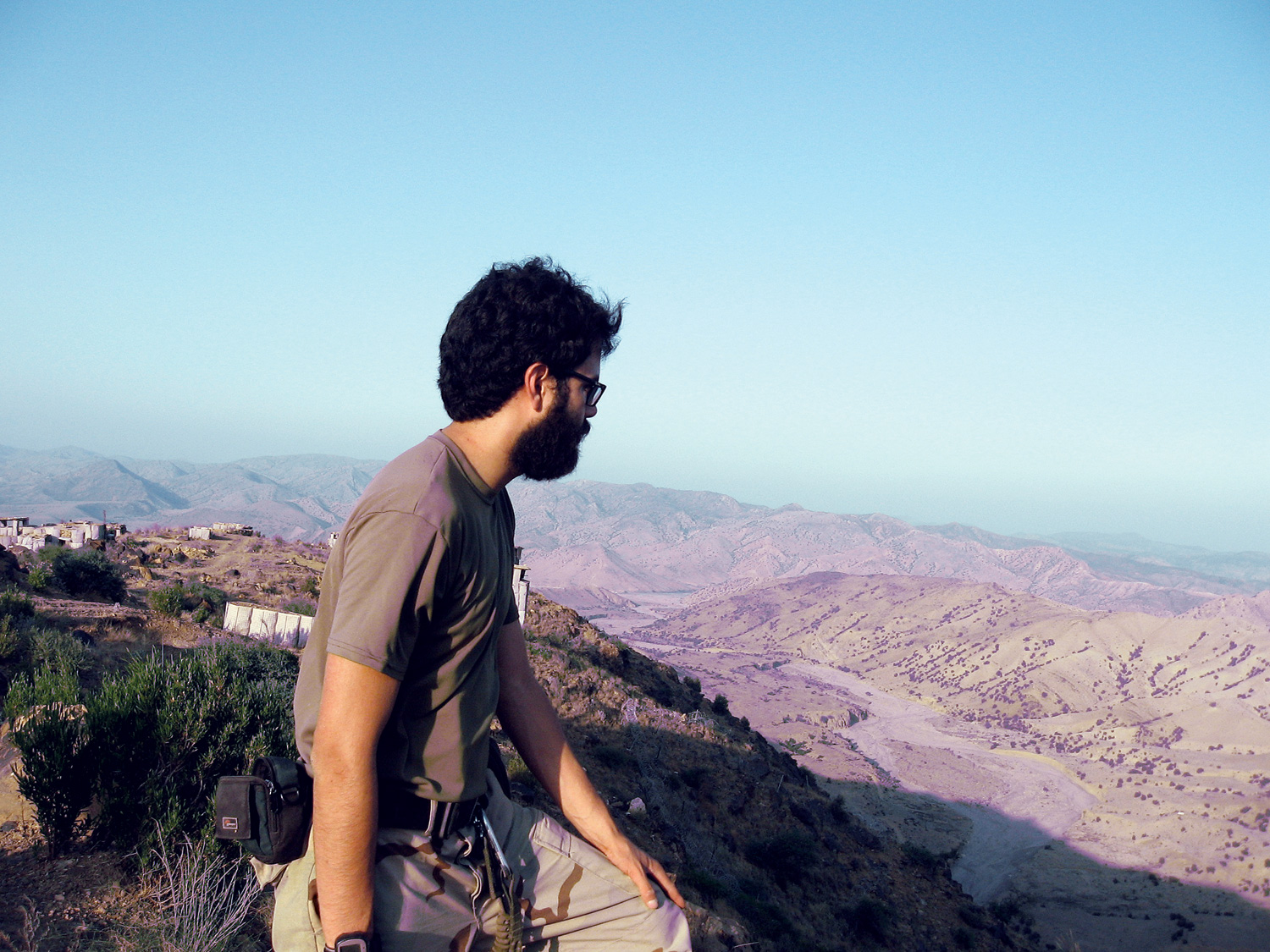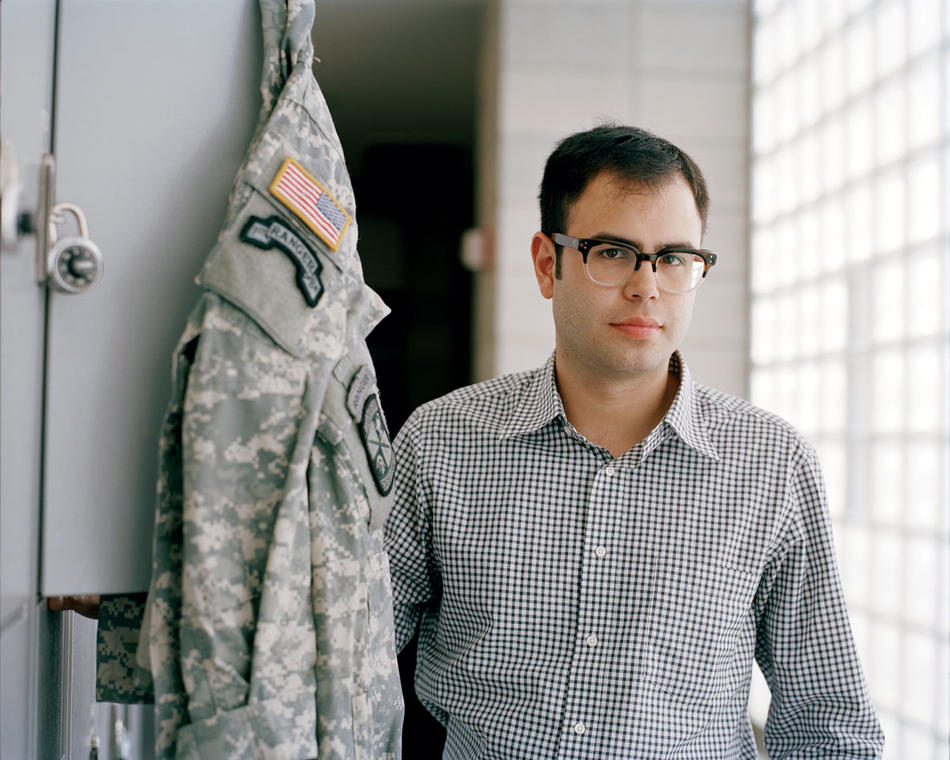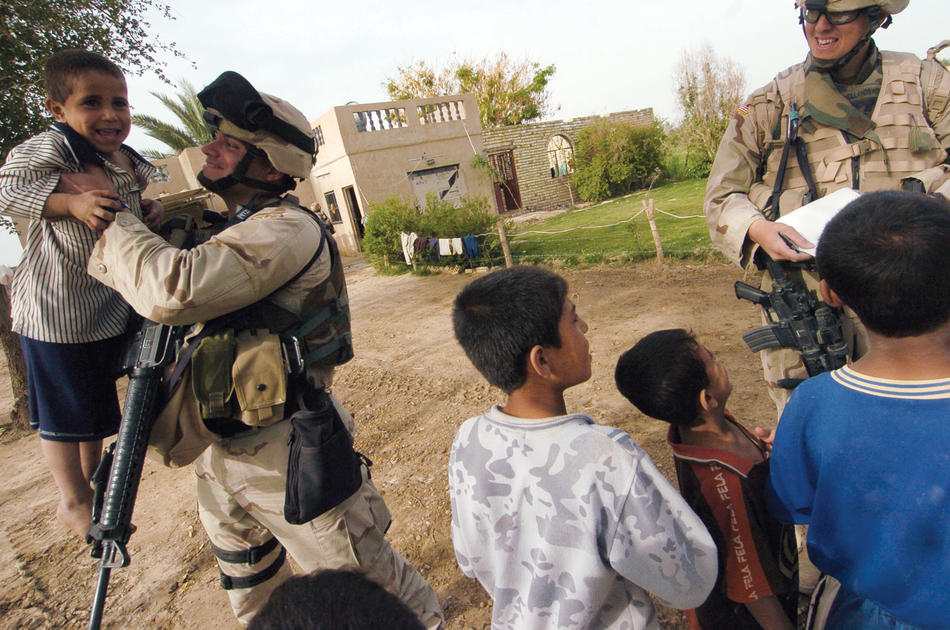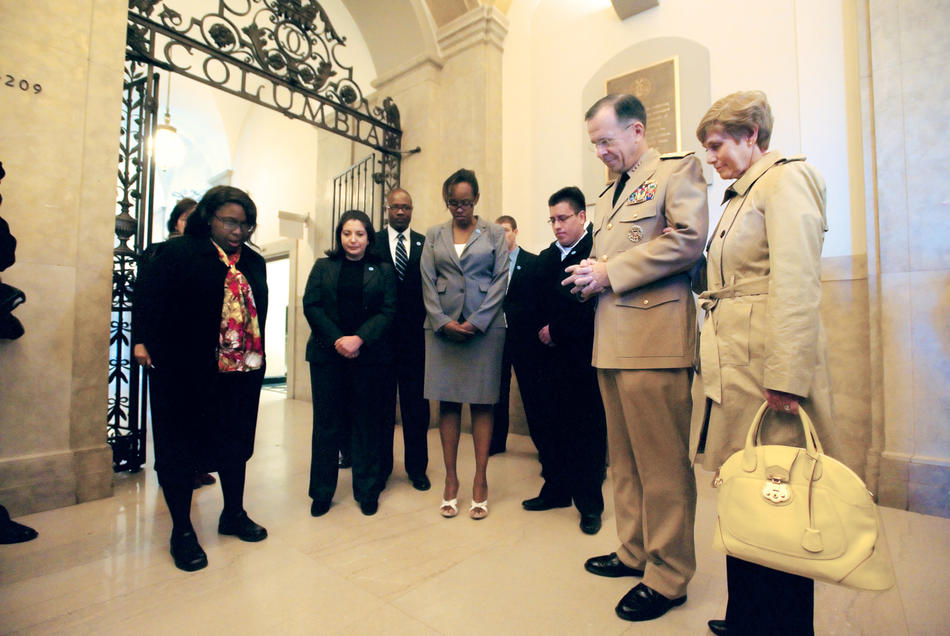
Heads turn as John McClelland strides along College Walk in camouflage fatigues, looking like a guy straight out of a “Go Army” poster. He’s defined by straight lines: perfect posture, Clark Kent eyeglasses, a side part in his shiny black hair.
As he makes his way to Lerner Hall, a voice rings out, “John, is that you?” McClelland turns and smiles. Yes, it’s John, the rosycheeked junior who’s usually wearing faded jeans and gray Converse sneakers, his hair in a tousle. But he’s just getting back from his ROTC class at Fordham University and rushing to his locker to change into civilian clothes before heading to his favorite place on campus.
In jeans and a T-shirt, he enters Butler Library. At his usual desk on the sixth floor, he sets down three Red Bulls, pulls several books out of his backpack, and slides into an oak chair. Sunlight flows through the grand windows, offering perfect reading light. “This is my spot,” he says. “If anyone is looking for me, they know this is where I’ll be.” Straight ahead are the 12th-story stacks, thousands of volumes on Middle Eastern, Asian, Persian, and Islamic studies.
McClelland, 26, came to Columbia in 2009 after serving five years as a Special Operations Army Ranger combat medic, an elite soldier trained as a paramedic. During five tours to Iraq and Afghanistan, he helped capture an al-Qaeda suspect, exchanged fi re with the Taliban, and treated both fellow soldiers and enemy combatants.
“I wanted to see what war was like up close,” he says, explaining his decision to join the Army. But now, as a student at the School of General Studies, he is on a new mission: to better understand Afghanistan.
McClelland is majoring in history and linguistics. When he graduates in May 2011, he will return to Afghanistan as an offi cer in the National Guard. Unlike during his three previous deployments, he’ll be able to communicate with Afghanis speaking Dari, Pashtun, and other dialects he’s studying at Columbia.
Curiosity brought him to this point in his life from suburban Virginia, and he says he set out to test himself, his values, and what he believes to be the truth. At Columbia, he says, “I am able to engage with people whose ideas I disagree with.” But some aspects of his behavior are shaped by the Army. He is always 15 minutes early for class. It allows him to position himself. He likes to sit front and center, not far from the professor. If the board is full, he’ll erase it. If there’s trash on the desk, he’ll throw it away. He wants everything ready when class begins.
He says the Army taught him to always think about his team, in this case, his classmates. It’s part of the Army Ranger Creed: “Never shall I fail my comrades. I will always keep myself mentally alert, physically strong, and morally straight and I will shoulder more than my share of the task whatever it may be, one hundred percent and then some.”
A Farewell to Arms
McClelland is part of a growing veteran population at Columbia, a group that has been nearly invisible since the late 1960s, when antiwar fervor led to the dismantling of the ROTC program and soldiers were viewed with disdain.
Unlike their predecessors, this new wave of returning service members are being recruited by administrators and welcomed by their peers, a profound shift in society’s attitude toward veterans. The veteran-population explosion at Columbia began in earnest in the fall of 2009, right after a new GI Bill went into effect, giving returning soldiers the financial means to attend private institutions. In the 2008–09 academic year, there were 169 veterans at Columbia; a year later, there were 230. This fall, that number is expected to jump to 300, says Mathilda McGee-Tubb, a University officer who helps veterans on campus with financial aid and other issues.
“There are veterans who would not have even applied to Columbia if it weren’t for the GI Bill,” says Sean O’Keefe ’10GS, an Army veteran and outgoing president of the U.S. Military Veterans of Columbia University, “MilVets” for short, a student organization that offers camaraderie and support. O’Keefe says when he left the military in 2007, the only schools that seemed to be recruiting veterans were DeVry University and the University of Phoenix.
The Post-9/11 Veterans Educational Assistance Act, often referred to as the “new GI Bill,” pays the tuition of veterans but caps the amount to the most expensive public college in a given state. (In New York, that’s $12,267 per term.) The bill, however, included a provision creating the Yellow Ribbon Program, which enables participating private schools and the federal government to pay the balance of tuition that is higher than the capped rate.
“We realized very early on that this bill would help veterans in the same way that the original GI Bill did,” says Curtis Rodgers, dean of enrollment management for the School of General Studies.
That bill, signed by Franklin D. Roosevelt in 1944, paid tuition for soldiers returning from World War II during a time in which the working class did not go to college. In the first year it was enacted, more than 1 million veterans attended institutions of higher learning, representing about 40 percent of college students across the country. At Columbia, it spurred the formation of GS in 1947, which accommodated legions of student veterans.
As the new bill was being signed in August 2009, Rodgers said administrators at GS saw it as an opportunity to recruit the best veterans. Months before the bill went into effect, Rodgers attended education conferences at two Marine bases in California, Camp Pendleton and Marine Corps Air Station Miramar, and encouraged vets to apply. “If you’re looking for the best and brightest nontraditional students,” Rodgers says, “the military and, especially within the Special Forces, is a good place to look.”
There are vets studying throughout the University: a handful in the law school, several in the schools of business, social work, and journalism, and a larger number in the School of International and Public Affairs. The vast majority are enrolled in GS.
The Embedded Journalist
During a journalism ethics seminar this past fall, Richard C. Wald ’52CC, ’53GSAS, a former top executive at ABC News who is the Fred W. Friendly Professor of Professional Practice in Media and Society, argued that war correspondents have to stop writing reports from their hotel rooms. They must, he argued, venture into combat zones. Military personnel may order you to stop, Wald told the class of about 60 students, but they are not allowed to bar you.
A hand shot up. Luis Carlos Montalván, a 37-year-old former Army captain who fought in Iraq, had something to say. “That’s not so,” Montalván told Wald. He says that under orders, he blocked journalists attempting to enter certain combat zones in Iraq. “They didn’t get past us.”
While students understood Wald’s point — that the U.S. military has no jurisdiction over reporters working on foreign soil — they were forced to acknowledge a truth: If armed soldiers insist you back off, invoking the First Amendment isn’t going to get a journalist anywhere.
War came up all the time in his classes at the J-school, Montalván says, and he found himself explaining things his classmates don’t know much about: why so much of the Iraqi middle class fled and how their leaving further destabilized the country’s economy, the fact that combat soldiers wound up serving as guards who protected employees of private U.S. companies, how improvised explosive devices are detonated using wireless technology.
“Luis brings a realism to discussion of issues,” says John Martin, a longtime broadcast journalist who taught Montalván in his National Affairs Reporting class. “He’s maneuvered in the real world, suffered from it, keeps studying it, and gives a lot of thought to his comments.”
Montalván has been an outspoken critic of the Departments of Defense and Veterans Affairs. In 2007, when he was still in the Army, he wrote several pieces, including an op-ed published in the New York Times, taking the Department of Defense to task for doing little to weed out corruption among Iraq security forces. That piece led to an interview on NPR. Montalván says a Fort Benning commander told him to stop. A few months later, having served 17 years, he resigned. He had seen some of the worst of war, and was, he says, “physically and psychologically burnt toast.”
When Montalván got out of the Army, he joined Iraq Veterans Against the War and decided to refine his writing skills. In May, he earned a master of science in journalism from the J-school, and is set to resume work on another master’s degree, this one in strategic communications, at the School of Continuing Education.
Speaking Out for Other Vets
After nightfall, during a mission in Iraq along the Syrian border in 2003, two men armed with knives ambushed Montalván and began slashing him. One attacker stabbed him in the arm. During the attack, Montalván fell on his back, fracturing three vertebrae. Subsequently, he received a Purple Heart. Montalván suffers from a permanent spinal injury, among other conditions.
He walks with a cane and Tuesday, his service dog, is always at his side. Each day, he takes 15 to 20 pills for post-traumatic stress disorder (PTSD), anxiety, and recurring pains in his back and leg. Tuesday is trained to sense changes in his breathing and scent that signal that he is about to have an anxiety attack. By nuzzling him, or barking, Tuesday can snap Montalván back to reality, before he goes into a PTSD-induced flashback.
Tuesday has appeared with Montalván on the CBS Early Show, BBC World News, CNN, and in dozens of newspaper articles, including the front page of the Wall Street Journal. After the two of them met Al Franken, a U.S. senator from Minnesota, Franken authored a bill that would provide money to train service dogs for wounded vets.
Montalván has also been on Capitol Hill several times to speak out against what he calls the military’s stigmatizing treatment of soldiers suffering from PTSD. “The military is a culture that promotes the ideal of a strong warrior, and because of that, service members and veterans suffering from trauma are institutionally dissuaded from seeking help and are even chastised for being weak when they seek help,” he says. “This is perhaps the big-gest factor in the recent fi nding that 18 veterans commit suicide every day.”
Montalván has been interviewed for thesis projects, once for a documentary about PTSD, another time for a multimedia package on service dogs. Being on campus, he says, has helped him adjust to civilian life after 17 years in the Army. “Studying and doing research brings me to a different place,” he says. “School has helped me fi nd that I have a new purpose.”
Finding a Clear Path
Ester Raha Nyaggah avoids Broadway during rush hour. She strategizes walks through campus when fewer people are out. She shops for groceries at midnight. But stepping onto crowded, noisy streets near campus is unavoidable. It means taking deep breaths as she zigzags around clusters of students. “I’m OK,” she says, “as long as I see a clear path.”
In her dorm room on 120th Street, Nyaggah shuts everything off and climbs onto a platform bed. “I have to just lie in silence for a while,” she says. “I love silence.”
Six years ago, Nyaggah worked in a cubicle below deck on the USS Nimitz, one of the largest aircraft carriers in the world. As a Navy personnelman, she processed human resources paperwork beneath the landing stop of F-18 fighter jets. The touchdowns sounded like explosions, she says, louder than thunder.
The constant booms damaged her hearing and gave her migraines. One day in the fall of 2003, Nyaggah got a migraine so intense it made her black out — while she was driving on a California highway. Her car flipped. She was in shock when paramedics pulled her out of the crumpled wreckage.
After the crash, the migraines stopped, but Nyaggah gets jittery when she hears loud sounds.
Nyaggah, 28, an immigrant from Kenya who grew up in California, is now a General Studies junior and doesn’t talk much about the Navy. She prefers to focus on her schoolwork. This past spring, she signed up for four classes and regretted it. She felt like a hamster on a wheel, trying to keep up. There was no time for play, no time for friends.
Nearly every night, at 6 p.m., when it was less crowded, she made her way to the third floor of Butler. There, she’d cram until 4 a.m. Nyaggah says she can manage on four hours’ sleep for weeks at a time. “When I was in the service, there were times I had to work 18-, 19-hour days,” she says. “It was good training for Columbia.”
Proving the Naysayers Wrong
When Nyaggah arrived, she worried that she wouldn’t measure up to her peers because she didn’t attend challenging public schools. But during her time at Columbia, she learned that while she works harder than some of her peers, she can hold her own.
Last fall, a student in her Introduction to Comparative Ethnic Studies class argued that undocumented immigrants should not aspire to more than menial low-wage jobs. Students turned their heads to the back of the classroom to see who made the remark. “We all looked at each other incredulously,” Nyaggah said. “‘Did he really just say that?’”
Nyaggah raised her hand, but didn’t wait to be called. She blurted, “The only difference between you and those people is you had opportunities,” she told him, as other students nodded their heads. Many immigrants, Nyaggah explained, came from places where going to high school is a luxury. Others in class continued where she left off. Recalling the incident, Nyaggah said, “I was not going to let it go.”
She says students assume she’s African American, and are surprised to find out she emigrated with her family from Nairobi. Nyaggah was 10 when her mother brought her, her older brother, and her younger sister to Orange County, California, where their father lived. The two divorced shortly after their arrival, but Lydia Nyaggah decided to raise her family there because the schools were good.
For Ester Nyaggah and her family, it meant navigating a vastly different culture. Kids in her neighborhood treated Nyaggah as an outcast. They called her nasty names, including racial epithets — even in class. “The teachers would hear them, but they would pretend they didn’t,” Nyaggah says.
There were few other black students in her classes. Most of her friends were Mexican Americans, who also were ostracized. From them, she began learning Spanish and Mexican slang. Friends nicknamed her a Kenyexican. Even in high school she barely spoke, and she was nominated “most shy student” during her senior year. When she graduated, she didn’t feel ready for college.
Looking for an opportunity to travel, she joined the Navy. There, some male sailors tried to intimidate her. “They would say to me, ‘The Navy is for men. You don’t belong here!’” Nyaggah says. She set out to prove them wrong.
A Purpose-Driven Life
“In the Navy it’s either speak up or get swallowed up,” Nyaggah says. When they were at the base, she would outrun most of the men during the morning runs, and was in such fi t condition, she was put in charge of morning fi tness exercises.
Those experiences taught Nyaggah to believe in herself. “She is such a strong person,” says her friend Carmen Gómez Ruiz, a 26-year-old GS student from Anaheim, California, who is studying economics and math. “She is very forgiving. She is not the kind of person who lives with resentment.”
Nyaggah says that minorities — whether they are women in the military or dark-skinned immigrants in a predominantly white American city — tend to cluster because they feel marginalized by the dominant group, not because they want to self-segregate. Having been in this situation several times herself, she wants to fi nd ways to help outsiders feel like they are part of a greater community. When she graduates in 2012, she says she wants to dedicate herself to helping others feel included, as part of a greater whole, perhaps by running a community-based agency.
Get on the bird!
John McClelland, the former Army Ranger medic, has a philosophy about sharing information: “What’s the point of experiencing something and keeping it to yourself?” Unlike some veterans who keep things to themselves, McClelland talks freely. If anyone asks about his time in Afghanistan, he’ll tell stories. One he often recounts is about the day he nearly died.
It was around 1 a.m. on June 10, 2006, and McClelland, along with several dozen members of an American task force, had just captured an al-Qaeda suspect in Helmand Province, Afghanistan. The soldiers were racing through poppy fi elds in the dark, heading to the spot where military helicopters were to swoop down and spirit them away.
They began hearing rapid gunfire. Scores of Taliban appeared, clutching Soviet Kalashnikovs. “We were outnumbered five to one,” McClelland says. The American soldiers jumped into a clay irrigation ditch filled with a slush of mud and manure.
McClelland and the others fired their M4 assault rifles. In the ditch, a gunner launched a rocket from his bazooka and the backblast knocked McClelland and several other soldiers standing nearby into the sludge.
Eight hours later, the Taliban stopped firing. “A sergeant major shouted, ‘Get on the bird!’ You’ve never seen so many people run so fast. We jumped right in, all piled up on each other,” McClelland says. “We were all caked in cow manure, hugging and kissing each other.
“I think about that day every single day,” says McClelland, who was elected the new president of MilVets, taking over where graduating president Sean O’Keefe left off. He plans to help recruit more vets to Columbia, and to explain to those on campus who are interested all that he’s learned during his time in combat.
“When I talk about my experiences, I am not trying to put any mystique around it,” he says. “If anything, I am trying to demystify it. That is, for me, another form of service.”







